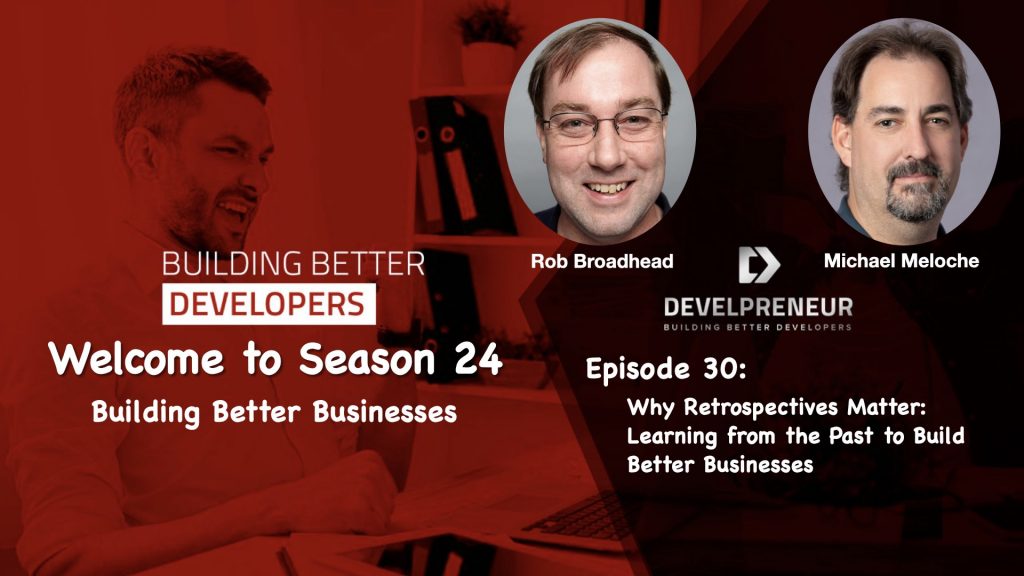In this episode of the Building Better Developers podcast, co-hosts Rob Broadhead and Michael Meloche dig into one of the most underused but powerful tools for business improvement: retrospectives. Whether you’re a startup founder, a seasoned project manager, or a solo entrepreneur, retrospectives are essential for continuous growth and team alignment.
This post captures the key takeaways from the episode and the challenge they leave for listeners at the end.
🔍 What are Retrospectives?
In agile development, retrospectives are a regular part of the process. At the end of each sprint, the team takes time to reflect on what went well, what didn’t, and what we can improve.
However, Rob and Michael point out that this practice shouldn’t be limited to software teams. Every business project—from product launches to marketing campaigns—deserves a structured review. Retrospectives help answer the most important question: How can we be better next time?
Retrospectives in the Real World
Rob shares a recent personal anecdote from a hockey game. A late penalty call—after video review—proved that sometimes the real story only becomes clear in hindsight. Similarly, project issues may only reveal their full impact when the dust settles.
Michael echoes this by discussing his struggle to disconnect from work, even after projects wrap. He emphasizes that finishing a project isn’t the end—it’s the beginning of learning.
🔧 How to Run an Effective Business Retrospective
1. Gather a Paper Trail
Pull together your milestones, status updates, emails, Slack threads, and anything else that shows how the project unfolded. Don’t rely on memory alone.
2. Look at the Whole Timeline
Too often, retrospectives focus only on the final sprint or the last few weeks. Instead, start at the beginning. What was your original estimate? What changed?
3. Invite Honest Feedback
Michael stresses the importance of creating a “safe space” where everyone can share the good, bad, and ugly without fear of blame. “This is not the time to get emotional,” he says. “It’s time to get real.”
💡 Callout: “If your retrospective is all rainbows and unicorns, dig deeper. There’s always room to improve.” — Rob Broadhead
4. Document Lessons Learned
After everyone has shared their thoughts, organize your notes into action items. What will you do differently next time? What can you improve today?
5. Prioritize for Change
Don’t try to fix everything. Choose 2–3 key areas for improvement and build them into your next plan. Track these changes across future projects to see if the issues were one-offs or trends.
🧩 Common Pitfalls and Hidden Insights
Many teams avoid retrospectives because they fear confrontation. But avoiding discomfort now only leads to bigger problems later. Michael highlights one big cause of project failure: misaligned talent. Assigning the wrong developer to a tech stack they don’t know can derail months of work.
Other questions to ask:
- Did we start testing at the right time?
- Did we bring the right people in early enough?
- Were our environments ready when needed?
These aren’t just technical issues—they’re signs of process breakdowns that can be corrected if surfaced honestly.
🎯 Episode Challenge: Your Mini Retrospectives
At the end of the episode, Rob offers a challenge:
Take 15–20 minutes today to reflect on your last project.
- What went well?
- What went poorly?
- What would you do differently next time?
Even if the project was months ago, the process of reflecting can help you identify what to change, and remind you to document better for next time.
📝 Pro Tip: Don’t wait until the end of a long project. Build mini-retrospectives into your workflow every few weeks.
Final Thoughts
This episode of Building Better Developers is a call to action: don’t waste your hard-earned experience. Capture it, learn from it, and grow. Whether managing a dev team, running a startup, or building your brand, retrospectives are the secret weapon for smarter, more effective business decisions.
Ready to improve your next project? Start with your last one.
📩 Keep Building Better
Subscribe to the Building Better Developers podcast for more actionable insights on product strategy, technology leadership, and business growth. Have feedback or questions? Reach out at [email protected]—the team would love to hear from you!


[…] Why Retrospectives Matter: Learning from the Past to Build Better Businesses […]